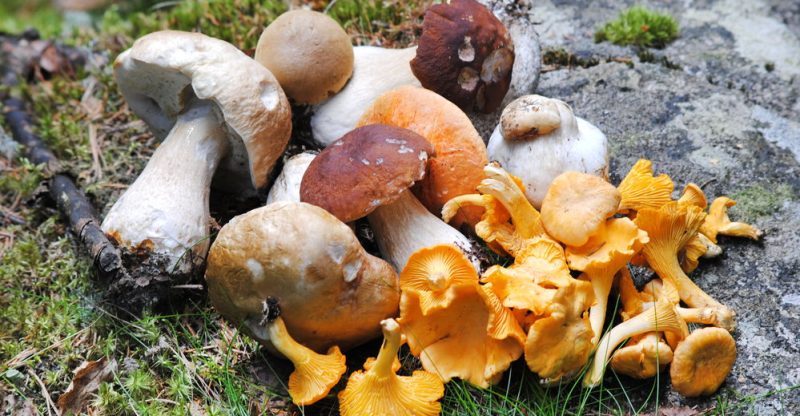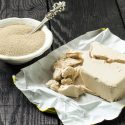9 Mushrooms Health Benefits and Nutrition
Mushrooms are a rich source of nutrients, minerals, and antioxidants. They are a type of fungus that has been used for centuries. They can also help reduce inflammation and fight cancer cells in the body.
Disease-fighting mushrooms check all the boxes for eating a healthy diet. Mushroom nutrition is low in carbs and calories yet high in B vitamins, trace minerals, fiber, and even protein.
Mushrooms are also anti-inflammatory foods, and mushroom nutrition has high quantities of beta-glucan components, which keep immune cells awake, and ergothioneine, a potent antioxidant that helps reduce overall inflammation.
Mushrooms for therapeutic purposes have a long history in Asian nations, dating back thousands of years. For example, in China, some kinds have long been associated with “a mix of spiritual power and the essence of immortality.”
Even though their usage in the Western Hemisphere has only recently increased, multiple recent studies demonstrate that they contain various important, physiologically active chemicals.
You could have a few questions regarding mushrooms and their nutrients, such as:
- What are the advantages of mushrooms in terms of health?
- Is it possible for me to consume mushrooms every day?
- Which mushrooms are OK for consumption? Is it true that certain mushrooms are harmful to your health?
- Is a mushroom a carb or a protein?
- Are mushrooms OK for vegetarians?
Let’s take a look at everything you need to know down below.
1. It inhibits the growth of cancer cells.
Mushrooms are recognized as effective cancer-fighting foods since they are known to be a natural cancer therapy and one of the finest foods for raising “natural killer cells” — the sort of immune cells that seek out and destroy hazardous malignant cells.
According to recent research, anti-cancer chemicals discovered in mushrooms play a critical role in guarding against oxidative damage and destroying cancer cells to prevent tumor growth through their antitumor, antibacterial, and antioxidant properties. Among the protective chemicals identified in this unique fungus are:
- Triterpenes
- Phenolic substances
- Polysaccharides
- Sterols
- Eritadenine
- Chitosan
This indicates that mushroom nutrition may help prevent DNA damage and cell mutations while also preserving healthy cells and improving the body’s capacity to eliminate harmful chemicals.
Furthermore, a comprehensive review and meta-analysis of observational data published in Advances in Nutrition in March 2021 indicated that eating at least two mushrooms per day might reduce cancer risk by up to 45 percent. “The link between increased mushroom intake and a decreased incidence of cancer, especially breast cancer, may imply a possible preventive function for mushrooms in the diet,” the researchers found.
2. Strengthens the immune system
Mushrooms include chemicals and complex molecules that have “anti-diabetic, anti-hyperlipidemia, anti-fungal, anti-inflammatory, immunomodulatory, antioxidant, anti-aging, anti-cancer, antiviral, and hepato-protective” properties, according to a paper published in the journal Molecules in 2020.
That may seem like a mouthful, but it means that since they’re linked to reduced inflammation, they may benefit practically every system in the body and protect you from a variety of ailments. Long-term sustained high levels of inflammation have been linked to chronic diseases, including diabetes and cancer.
Mushrooms also can naturally combat harmful germs and viruses. But, merely to thrive in their native habitat, they need powerful antibacterial and anti-fungal substances.
It’s no surprise, therefore, that these beneficial substances can be extracted from a variety of mushrooms and employed to protect human cells. They’ve even been demonstrated to guard against lethal multi-resistant bacteria and other microbes that cause many health issues.
In reality, several of the ingredients in popular antibiotics like penicillin, streptomycin, and tetracycline are obtained from mushroom fungal extracts.
3. It is good for your heart.
One natural strategy to decrease cholesterol levels is to eat more mushrooms. Many species of mushrooms may help decrease “bad” LDL cholesterol levels and prevent artery hardening, lowering the risk of cardiovascular disease.
Mushrooms contain sterol components that prevent cholesterol from being produced in the liver while also increasing “good” HDL cholesterol levels. They also include phytonutrients that help prevent cells from adhering to blood vessel walls and developing plaque, improving circulation and keeping blood pressure in check.
4. It boosts your energy levels.
Mushrooms are high in B vitamins, which aid in adrenal function and converting nutrients into energy that your body can utilize. B vitamins also help break through brain fog, prevent thyroid issues, and maintain a healthy metabolism by supporting neurotransmitter activity.
5. Assists with weight loss.
Because mushrooms are a low-calorie, nutrient-dense meal, studies show that substituting them for meat daily may help you lose weight. Eating mushrooms many times a week has been related to weight reduction, a smaller waist circumference, and lower body fat levels.
6. It contains vitamin D.
Many individuals suffer from vitamin D insufficiency, which has been related to anything from poor immunological function to depression. Although sun exposure is the greatest source of vitamin D, some mushrooms may also deliver a substantial amount of this essential vitamin.
Mushrooms exposed to UV radiation have higher vitamin D concentrations, whether cultivated outdoors or inside under particular light sources. Increasing your intake of vitamin D-rich foods may lower your risk of cancer, cardiovascular disease, mental disorders, and bone loss.
According to studies, many types of mushrooms contain a significant quantity of vitamin D2 and vitamin D3 (the form most absorbed by humans), and vitamin D4.
7. Helps to improve brain function.
Is your quality of life being harmed by persistent stress? Adaptogens include some kinds of mushrooms, particularly reishi.
This implies they may assist your body in dealing with stress and lowering cortisol levels. Inflammation is known to have a vital role in cognitive function, mood, energy levels, and age-related neurodegenerative illnesses, and some mushroom species may help reduce it.
8. Can aid bone strengthening.
Because certain mushrooms make vitamin D, which you may then take when you eat them, studies show that including them in your diet can help strengthen your bones and prevent you from dangerous illnesses like osteoporosis.
Vitamin D is required for calcium absorption, and a deficit in this important vitamin may lead to fractures, weaker bones, and mineralization abnormalities. In a study published in the European Journal of Nutrition, mice fed shiitake mushrooms loaded with vitamin D and calcium had higher bone mineral density and were less likely to develop osteoporosis.
9. It may help with fertility and reproductive health.
Animal studies have shown that these types of fungus may aid in the treatment of age-related sexual dysfunctions due to their anti-inflammatory and antioxidant properties (desire, arousal, orgasm, and pain).
According to one research, Cordyceps supplementation improved sperm motility, survival rates, and progressiveness in rats. Other animal studies have shown some indication that these fungi may help maintain appropriate levels of reproductive hormones like testosterone and improve libido by improving energy and stamina.
Mushrooms Nutrition
Is it a fungus, a vegetable, or meat for mushrooms?
Mushrooms are a form of helpful fungus, even though most people think of them as vegetables.
Any macro fungus with a characteristic fruiting body big enough to be seen with the naked eye and plucked by hand is referred to as a “mushroom.” There are now about 14,000 distinct mushroom species growing throughout the planet – and maybe many more.
There’s still a lot to learn about the many different mushroom species that exist on the planet. For example, scientists believe that there are about 140,000 distinct species in existence, implying that scientists only know roughly 10% of the potential species at the current moment.
Species that grow all over the globe range in size from little to large and come in a variety of hues (brown, tan, red, orange, etc.).
Which mushroom is the healthiest? The following are some of the most common edible mushroom varieties:
Although the precise calorie and nutrient content vary depending on the variety, mushroom nutrition is often low in carbs, calories, fat, and salt (making it a perfect option for the low-carb or keto diet). Mushroom nutrition also contains antioxidants, energetic B vitamins, copper, selenium, and other minerals.
The nutrients in one cup of raw white button mushroom nutrition are as follows:
- Calorie count: 21
- Carbs: 2 grams
- Protein content: 3 grams
- Fiber: 1 gram
- Riboflavin: 0.4 milligrams (23 percent DV)
- Niacin: 5 milligrams (17 percent DV)
- Pantothenic acid: 4 milligrams (14 percent DV)
- Copper: 0.3 milligrams (13 percent)
- Selenium: 9 milligrams (13 percent DV)
- Potassium: 305 milligrams (9 percent DV)
- Phosphorus: 83 milligrams (8 percent DV)
Recipes
Fresh or dried mushrooms may be found at grocery shops, health food stores, or at your local farmers’ market, where you could find some unusual varieties.
Because mushrooms are porous and tend to absorb toxins from the soil they’re grown in, it’s crucial to purchase and consume organically farmed mushrooms whenever feasible. In addition, when mushrooms are chemically sprayed or exposed to pollutants in the water, they may contain high amounts of toxins like heavy metals and pesticides; therefore, it’s worth spending the additional money to get the highest quality you can.
Dried mushrooms are more costly than fresh mushrooms, but they’re a decent substitute when fresh mushrooms aren’t available.
Some mushrooms are just only wiped down with a moist cloth to eliminate any dirt (like shiitake, portobello, small crimini, and button mushrooms). Like the chanterelle mushroom, others should be scrubbed with a soft brush.
Because mushrooms absorb water quickly, you don’t want to rinse them for too long or soak them in water, which might cause them to become “water-logged.” A simple washing generally suffices to remove any apparent dirt.
Keep them dry in the refrigerator until you’re ready to use them, and keep in mind that they have a limited shelf life, so use them as soon as possible.
Many individuals choose to keep them in a paper bag instead of a plastic bag. This enables air to flow in and out, keeping them in excellent shape.
When it comes to preparing mushrooms, each species requires a distinct approach. For example, dried mushrooms may be rehydrated by mixing them with boiling water and allowing them to rest for 15 minutes to swell up to a greater volume.
Large mushrooms, such as portobellos, may be baked while maintaining their hard structure, while smaller delicate mushrooms, such as shiitakes and cremini, should be sautéed in a skillet or wok. Remember that mushrooms take a lot of moisture at first but then release it, so there’s no need to smother them with sauce or oil.
All types of savory meals, from omelets and stir-fries to whole grain pilaf or side dishes, benefit from the earthy taste and chewy, robust texture of mushrooms. They may also be used as a mushroom risotto foundation, added to mushroom spaghetti, or cooked into a delicious mushroom sauce.
For a simple but tasty side dish, sauté, roast, grill, or stir-fry the fungus.
Side Effects and Risks
Always opt for a trustworthy brand, whether purchasing mushrooms in supplement form or foraging for mushrooms in the wild on your own. If you’re going mushroom scavenging, talk to someone who knows about wild mushrooms and can identify them.
Is it possible for a mushroom to kill you, and why are certain mushrooms dangerous for you?
Even when taken in tiny doses, certain mushroom varieties, such as psilocybin mushrooms and Amanita mushrooms, popularly known as psychedelic mushrooms or “magic mushrooms,” contain chemicals that may elicit symptoms including hallucinations and alterations in perception. Other mushrooms, such as the death cap, might be deadly or tainted and are not intended for human consumption, so be cautious when purchasing “medicinal mushrooms.”
Also, wherever feasible, search for organic mushrooms; if you can’t locate any, give unclean mushrooms a thorough washing or wipe down to eliminate residue, germs, and perhaps insects.
Keep in mind that most mushrooms include purines, which are present naturally in certain plants and have been related to health issues in the past. Purines are broken down into uric acid, which may build up and cause illnesses like gout or kidney stones in rare cases.
As a result, if you already have a purine-related disease, you should consume mushrooms in moderation.
Conclusion
- Why are mushrooms beneficial to one’s health? Mushroom nutrition may aid in slowing cancer cell development, boost energy, improve heart health, improve brain and immunological function, and assist with weight loss.
- Mushroom nutrition is also outstanding. Although it varies per edible mushroom species, mushrooms normally include a low number of calories, fat, and carbohydrates per serving and a high level of antioxidants, B vitamins, and other micronutrients.
- There are hundreds of distinct species that grow all over the planet, and many of them are still unknown to experts. Shiitake, morel, oyster, and portobello mushrooms are all common mushrooms.
- It’s important to remember that not all species are edible. In addition, certain varieties of mushrooms may be toxic, while hallucinogenic mushrooms can alter one’s vision.
- Take advantage of the unique advantages these delectable fungi offer by using mushroom nutrition in a range of meals such as sauces, stews, soups, and side dishes.
Frequently Asked Questions
Which type of mushroom is good for your health?
A: Most mushrooms are edible, but they vary in their effect on your health. Some may be more nutritious than others, depending on their nutritional properties, so it would be best to ask a professional cooking instructor if you’re uncertain of what type of mushroom is good for you and how much of that particular kind should be eaten each day.
What are the benefits of eating mushrooms?
A: Mushrooms are an excellent source of Vitamin D and effectively reduce the risk of multiple sclerosis, Alzheimer’s disease, and rheumatoid arthritis. They also contain several other nutrients that may help improve your moods.
Can you eat mushrooms every day?
A: You can eat mushrooms every day if you like.
FDA Compliance
The information on this website has not been evaluated by the Food & Drug Administration or any other medical body. We do not aim to diagnose, treat, cure or prevent any illness or disease. Information is shared for educational purposes only. You must consult your doctor before acting on any content on this website, especially if you are pregnant, nursing, taking medication, or have a medical condition.
HOW WOULD YOU RATE THIS ARTICLE?





